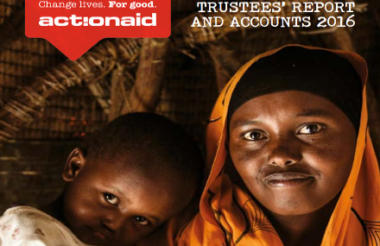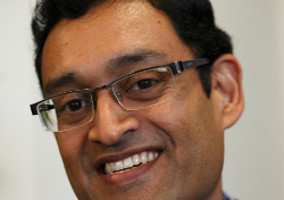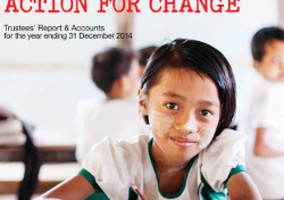ActionAid UK has increased its general reserves so that it has 5.4 months of planned expenditure, up from its usual policy of 2.6 months, due to uncertainty about the impact of the new fundraising regulations.
According to the charity’s accounts for the year ending December 2016, the charity’s general reserves are of £7.9m at the end of the year, which represents 5.4 months, up from 5.1 the previous year.
It said in its accounts: “We believe this is temporarily acceptable due to uncertainty about the impact of the new fundraising regulations on our committed giving programme.”
It said it forecasts that the “general reserve will fall over the next three years back to the policy level, with funds being used to fund systems and fundraising investments required to deliver the new strategy”.
ActionAid’s policy for general fund reserves is to retain a minimum of 2.6 months of planned annual expenditure (the equivalent to £3.8m).
It said: “Our trustees believe that this balances the need to apply funds to our mission whilst at the same time ensuring there are sufficient funds to run our day-to-day business, to pre-finance some projects funded by the European Union and to protect us from unanticipated shocks.”
ActionAid’s cash position at the end of the year stood at £17.9m and consisted of both restricted and unrestricted funds.
In the introduction from chair Margaret Casely-Hayford, and chief executive Girish Menon in the report, they said: “The publication of new Charity Commission CC20 fundraising guidance inspired us to redouble our efforts to ensure that every aspect of our fundraising reflects our values of respect, honesty and transparency.
“That’s why in March 2016, the board of trustees published ActionAid in the UK’s new commitment to best practice in fundraising, Treating Donors Fairly, which commits us to be fully accountable to all our supporters, particularly those in vulnerable circumstances, protecting their privacy and rights at all costs.”
They said that “over 140,000 people in the UK chose to support our work with a regular or cash donation in 2016”, and that this means the charity was able to support the “ground-breaking work of the entire ActionAid Federation – an alliance of 45 countries united in tackling today’s unprecedented global challenges”.
In 2016, ActionAid in the UK remitted £37.3m or 62 per cent of its total income to the ActionAid International Federation. ActionAid in the UK had a total income of £60.4m which accounted for 34.3 per cent of the total Federation income budget of £176m.
Charity’s income
ActionAid’s accounts show that its income fell by 7.5 per cent in 2016, from £65.3m to £60.4m, following an increase of 3 per cent in 2015. It said that the key reason for this fluctuation in income was that it “did not need to respond to major humanitarian disasters to the same extent as in 2015”. In 2015 the charity raised £5.8m to support disaster relief and reconstruction in Nepal.
It spent £56.6m in 2016, 84 per cent of which was on charitable activities, consisted with the 85 per cent spent in 2015.
It said: “Our charitable activities include grants for work around the world by ActionAid Federation members in areas of the greatest need, emergency and humanitarian work, campaigning and policy influencing in the UK and overseas and education work in the UK.”
The average number of full time equivalent staff in the year was 186, slightly down from 188 in 2015. Redundancy and termination costs were £46,000, up from £30,000 in 2015. All of this expenditure was paid out during 2016. Nine members of staff were paid over £60,000
Chief executive, Girish Menon, received £106,743 in 2016, including his gross salary and employer’s pension contributions. In 2015 the aggregated remuneration of the three staff who served as chief executive was £119,127, of which £36,747 was in relation to Girish Menon.
Related articles












